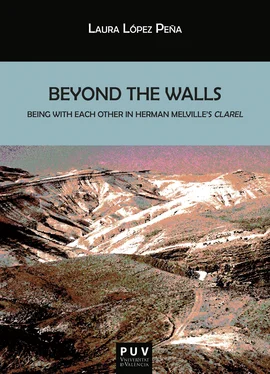Laura López Peña - Beyond the Walls.
Здесь есть возможность читать онлайн «Laura López Peña - Beyond the Walls.» — ознакомительный отрывок электронной книги совершенно бесплатно, а после прочтения отрывка купить полную версию. В некоторых случаях можно слушать аудио, скачать через торрент в формате fb2 и присутствует краткое содержание. Жанр: unrecognised, на английском языке. Описание произведения, (предисловие) а так же отзывы посетителей доступны на портале библиотеки ЛибКат.
- Название:Beyond the Walls.
- Автор:
- Жанр:
- Год:неизвестен
- ISBN:нет данных
- Рейтинг книги:3 / 5. Голосов: 1
-
Избранное:Добавить в избранное
- Отзывы:
-
Ваша оценка:
- 60
- 1
- 2
- 3
- 4
- 5
Beyond the Walls.: краткое содержание, описание и аннотация
Предлагаем к чтению аннотацию, описание, краткое содержание или предисловие (зависит от того, что написал сам автор книги «Beyond the Walls.»). Если вы не нашли необходимую информацию о книге — напишите в комментариях, мы постараемся отыскать её.
Beyond the Walls. — читать онлайн ознакомительный отрывок
Ниже представлен текст книги, разбитый по страницам. Система сохранения места последней прочитанной страницы, позволяет с удобством читать онлайн бесплатно книгу «Beyond the Walls.», без необходимости каждый раз заново искать на чём Вы остановились. Поставьте закладку, и сможете в любой момент перейти на страницу, на которой закончили чтение.
Интервал:
Закладка:
In line with Bauman’s sociological yearnings, Gayatri Chakravorty Spivak’s Nationalism and the Imagination (2010) also vindicates the need to “think without nation”, to de-transcendentalize nationalism through an exercise in equivalence which “rid[s] the mind of the narrowness of believing in one thing and not in other things” (72). Grounding this claim on the notion of comparativism, which she uses to the analysis of languages, Spivak conceives “equivalence” as the exercise of being aware that all human beings in all parts of the world feel a similar attachment to their “corners of the world” (their languages, lands, families, religious and nonreligious beliefs, cultural affiliations, gender and sexual identities, etc.), and that, therefore, each of these smaller or larger personal “spaces” deserves to be as equally respected, protected, preserved, and nourished, as it needs to be transcended in order to avoid falling into exceptionalist or monolithic conceptions of the world. Spivak defines equivalence thus:
Here is equivalence. It is not equalization, it is not a removal of difference, it is not cutting the unfamiliar down to the familiar. It is perhaps learning to acknowledge that other things can occupy the unique place of the example of my first language. This is hard. It’s not an easy intuition to develop, yet this need not take away the comfort in one’s food, one’s language, one’s corner of the world. Although even this the nomad can give up. Remember Edward Said quoting Hugo of St Victor: “The man who finds his homeland sweet is still a tender beginner; he to whom every soil is as his native one is already strong; but he is perfect to whom the entire world is a foreign land”. […] What a comparativism based on equivalence attempts to undermine is the possessiveness, the exclusiveness, the isolationist expansionism of mere nationalism. (31-32)
Spivak locates this comparativist movement in the infant impulse to negotiate the private and the public through the process of acquisition of the mother tongue, which inscribes the child in the past, present, and future (public) history of that language, at the same time that s/he makes the language private and unique by appropriating, interiorizing, and reinventing it. Although Spivak specifically refers to the multilingual reality of India in order to explain her views on equivalence, the comparativist move is not limited to the linguistic domain but filled with a wider dimension that can be extrapolated to ways of relating—inter-personally, internationally, inter-culturally. This relational spaces not only foster a movement away from self-enclosing definitions of community and nationalism toward “the complex textuality of the international” (Spivak 21), but also a de-transcendentalization of nationalism itself.
Great indeed is the challenge of transcending nationalism in our present days, as it also was in the nineteenth century, the age of widespread nationalist waves and of the construction and consolidation of nations and definitions of national subjects. As James Mayall has noted, nationalism has proved successful as a system which thwarts people from imagining an alternative to the nation-state model (25). So has, in a similar way, race, as Paul Gilroy has convincingly analyzed in his 2000 Against Race , where he moreover vindicates a movement away from “race-thinking” in order to embrace a planetary kind of humanism. In a similar line of thought, other thinkers have emphasized the problems of global movements such as cosmopolitanism and internationalism, noting how these ultimately and paradoxically reinforce nationalism and other communitarianisms while declaring a global affiliation with humanity. Most remarkably, Jacques Derrida moved closer to this direction in a 1997 lecture at the University of Sussex, proclaiming that, if cosmopolitanism constitutes a positive understanding of human relationships, it is also a limited concept to think democracy and the political, because it is constrained by nation-state boundaries and by notions of citizenship. If, as Derrida noted, traditional cosmopolitanism, from the Greeks to Kant, perceived human beings as sharing a condition of brotherhood in their quality of citizens of the world, the conception of cosmopolitanism inherited from Kant, according to Derrida, limits the relationship of hospitality with the other through a series of conditions, most importantly the fact that “you should of course welcome the stranger, the foreigner, to the extent that he is a citizen of another country, that you grant him the right to visit and not to stay” (“Politics”). Thus, the role reserved for friendship in cosmopolitan politics is limited by both nation-state boundaries and clear-cut (frequently homogenizing and excluding) definitions of citizenship. Derrida’s vindication is that, while there is still much work that needs to be undertaken within the limits of the cosmopolitical, we also need to move beyond the nation-state and citizenship, toward a conception of democracy that “redefine[s] the political not only beyond the nation-state but beyond the cosmopolitical itself” (“Politics”). With this purpose, Derrida defends the potentiality of interpersonal relationships, claiming that friendship can develop a politics that rethinks democracy beyond such limits. Without ignoring the complexities of rethinking democracy beyond the limits of the nation-state and the cosmopolitical through the notion of friendship, Derrida defends the unquestionable necessity of such a task:
That of course looks like a utopian or very distant perspective. I don’t think so. Of course there is an enormous distance if we think that these things have to be reached and concretely embodied, but we know today as soon as we open a newspaper that these problems are urgent and prevalent in everyday life. In everyday life we see that the classical concept of democracy, the way it inhabits all the rhetoric of politicians and parliament, is shaken, that we need something else. We see that the concept of citizenship, the concept of the border, immigration, are today under a terrible seismic displacement. We not only feel this: we can analyse this every day, so what seems to be, and is, very far ahead of us, is also very close to us every day, and it is an urgent task to re-elaborate, to re-think, to re-engage and to be committed differently with these issues. (“Politics”)
In Melville’s times, the concept of democracy was also being “shaken”, particularly in the postbellum years. Actually, Melville’s full contemporary and poet Walt Whitman would claim in his 1871 Democratic Vistas that American democracy was a dormant abstraction still awaiting realization: “We have frequently printed the word Democracy. Yet I cannot too often repeat that it is a word the real gist of which still sleeps, quite unawaken’d, notwithstanding the resonance and the many angry tempests out of which its syllables have come, from pen or tongue. It is a great word, whose history, I suppose, remains unwritten, because that history has yet to be enacted” (37). Melville embarked on a rethinking of democracy and democratic human relationships outside nation-state boundaries, without neither falling into the defense of a “world community” based on an essentialist—and almost always supremacist—“common” identity, nor into an abstract universalism that neglected plurality in an imperialist endeavor to unify, and consequently neutralize, such plurality. Melville conceived universalism as a political and ethical project based on and constructed from plurality, permanently in progress, differently shaped in every intersubjective encounter, and therefore subjected to the capacities and limitations of the very human beings who might either create or entirely suppress it. This is a decentralized process built from plurality and polyphony, which emphasizes its own processual and imperfect nature since, as sociologist Jeffrey Weeks claims, “[h]umanity is not an essence to be realized, but a pragmatic construction, a perspective, to be developed through the articulation of the variety of individual projects, of differences, which constitute our humanity in the broadest sense” (199-200). It is relevant to underline, in this respect, how, throughout history, all genocidal practices, wars, cultural and religious persecutions, slavery, colonialism, racism, and other forms of discrimination, have been sustained—and continue to be sustained—through systematic processes of dehumanization. In other words, it has been because the “Other” was/is deployed from the humanity that s/he shared with his or her victimizer, and thus turned into an inferior human being or into a creature that was/is even regarded as non-human at all, that the victimizer could/can feel the right to oppress, colonize, enslave, murder, torture, rape, or inflict any possible form of violence or subjection upon another human being. Weeks’s conception of humanity is in tune with Hannah Arendt’s arguments on polyphonic dialogism and negotiation of meaning as a process for humanizing the world. In such dialogism, which this study claims Melville’s texts exemplify, answers are never conclusive but merely partial interpretations or ways of understanding the world, not endings but starting points for further questions, debate, and negotiation. Considering Melville’s literary project, this study, hence, disagrees with Bruce Robbins’s affirmation that “[c]ommon humanity is too weak a force to generate sufficient solidarity” (4). Yet, Melville’s oeuvre does not fall into a naïve championing of intersubjectivity either. As analyzed through the 1876 Clarel: A Poem and Pilgrimage in the Holy Land , at the same time that they emphasize the transformative effects this process may enable upon human thinking and ways of relating, Melville’s works analyze, with a much more pessimistic and tragic awareness, the neutralization of intersubjective dialogue by individuals who do not transcend their individualities and monologic thinking parameters, an attitude which, in all cases, as the author shows readers, leads to (self-)destructive and violent consequences. This tension between the potentialities of developing intersubjective relationships while, at the same time, the failure of human beings to open themselves to other human beings or to negotiate the other’s difference is a central aspect in the universalist project of Melville’s Clarel . The awareness of the destructive as well as of the constructive potentiality of human beings, however, does not lead Melville to reject the project: common humanity imposes an ethical obligation which is beyond community or identity-based walls, and which is inseparable from the creation of democratic human relationships and thinking.
Читать дальшеИнтервал:
Закладка:
Похожие книги на «Beyond the Walls.»
Представляем Вашему вниманию похожие книги на «Beyond the Walls.» списком для выбора. Мы отобрали схожую по названию и смыслу литературу в надежде предоставить читателям больше вариантов отыскать новые, интересные, ещё непрочитанные произведения.
Обсуждение, отзывы о книге «Beyond the Walls.» и просто собственные мнения читателей. Оставьте ваши комментарии, напишите, что Вы думаете о произведении, его смысле или главных героях. Укажите что конкретно понравилось, а что нет, и почему Вы так считаете.










